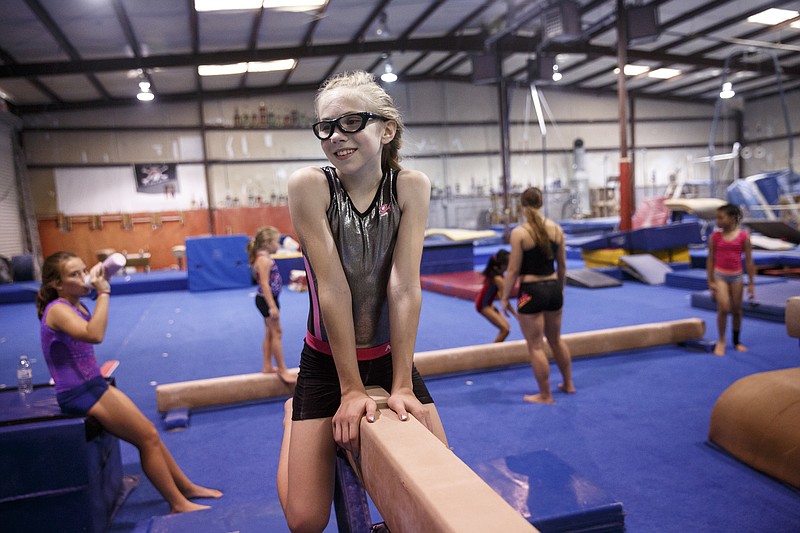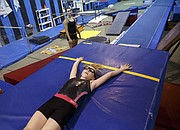Ten-year-old Abigail Bean was trying to do a handstand on the beam in the gym at the Tennessee Academy of Gymnastics on Riverside Drive.
She stepped forward, bent down and kicked her feet into the air, arching her back and balancing on her hands, and then she flipped back up, her feet trying to find solid footing on the four-inch-wide piece of wood.
But on this Wednesday evening, she was having a hard time getting her feet to land squarely.
"It's hard to spot my foot," Bean said.
And so she repeated the maneuver over and over, ignoring the dozen-odd other girls leaping and tumbling and flipping on the beams and bars and mats scattered around the gym.
Bean is like thousands of other wannabe Olympians - young children who have spent the past week entranced by the medal-winning performances of Simone Biles and her teammates on the U.S. Women's Gymnastics team.
But she has an additional difficulty that most young gymnasts don't face: she can hardly see her surroundings.
Shortly after she was born, she was diagnosed with ocular albinism and infantile nystagmus, conditions that left her legally blind.
So how does she do gymnastics?
"It's a feel, a sense of where your body is in space," said Lee Ann Denham, who with her husband Larry has owned Tennessee Academy of Gymnastics for more than 30 years. "She has done enough front tucks to know that if she doesn't leave the floor straight, she doesn't flip up high enough."
Bean's explanation is much simpler: "I just flip."
Since she was 5, she has practiced for three and a half hours at a time, three times every week.
Choosing gymnastics as a sport was easy.
"I don't really like running. I'm not allowed to play anything with a ball in it," she said. "I like to flip and flip over things."
But for a while, that seemed very unlikely ever to happen.
Bean's eyes never developed properly. The retina and optic nerve didn't have enough pigment, said Dr. Sean Donahue, the Vanderbilt University School of Medicine eye specialist who has treated her all her life.
"As soon as she walked in, Donohue asked if anybody in our family had a history of albinism," Bean's mom, Amanda, said. "But we don't know of anybody anywhere."
Some albinos have no pigment anywhere, but Bean lacked it primarily in her eyes. All albinos suffer from eye problems, Donahue explained.
Because of the lack of pigment, when Bean's retina formed, it lacked the central core of cones needed for her eyes to make out an image. Because the eyes can't find a place to focus, they dart rapidly back and forth, even when she is looking straight at someone.
What the eyes are searching for is what doctors call the "null point," a place where they can focus best.
"The brain doesn't get good images, so the brain keeps trying to find the good images," said Donahue, who is the chief of the pediatric ophthalmology department at Vanderbilt.
To find that point, patients often twist their heads into uncomfortable positions. It is not uncommon for patients to turn their heads 60 degrees left or right in an attempt to see better, Donahue said.
"If she is reading or concentrating heavily, she turns her face and puts her eyes to one side," said Amanda Bean, who works in a pediatric dentist's office.
Donohue's solution was an operation to literally move the eye around in its socket.
"There are six muscles that move each eye, so we move the muscles and that moves the eye," he said. "We put the eyes in a better position in the eye socket so the null point is centered straight ahead."
The operation was a success, in that Bean's best vision is closer to the front, but she still can't see well. The glasses she wears don't help her vision that much, but they help her eyes stay focused more, her mom said.
At school, her desk is a long folding table with a video camera mounted vertically to enlarge the text in books. At home, when the family is watching a movie, she uses software that streams it to her iPad at the same time so she can hold the screen close to her face at an angle where she can see.
"Technology has been a huge benefit," said her dad, Nathan, who works in the IT department at BlueCross BlueShield.
Her vision teacher at McConnell Elementary in Hixson, where she is an honor student, takes her on "life skills" trips twice a week to teach her how to maneuver with a cane or a small telescope she can use to magnify traffic signs.
She has a companion dog, a black Lab named Blossom, who helps build her confidence. She won't be eligible to go out on her own with a guide dog until she is 18, but learning to take care of Blossom prepares her for that day, Amanda Bean said.
She will probably not be able to drive a car, her mom said.
"Driverless car technology really appeals to us," her dad added, laughing.
In gymnastics, she gets no special treatment.
The judges don't know she has vision trouble, but her teammates help out. Before the beam routine, for example, a judge raises a small green flag to tell the gymnast to start running. Since Abigail can't see the flag, a teammate tells her when to go.
On the uneven bars, years of practice tells her how far away one bar is from the other. On the vault, however, she can't really see the trampoline until she is right on top of it, her mom said.
Bean only started competing last year. In an early match she medaled in every event, finishing second on the uneven bars. But the next match was a different story.
"She got 11th place and she was not the least bit happy about it," her mom said. "She also learned a really hard lesson in how to be a good loser."
Gymnastics has been good for her daughter, even if she never makes the Olympics.
"It has helped her balance, her coordination, her motor skill development, it's taught her how to fall and not get hurt," Amanda Bean said. "And gymnastics teaches lots of life lessons."
Whether Abigail can achieve her goals will depend on her motivation, and neither her doctor nor her mom are betting against her.
"She's done beautifully well, and doesn't feel [her blindness] is an impediment to her," Donohue said. "She gets out and nothing is going to stand in her way, in gymnastics and in her academic performance."
Why does Abigail say she spends so much time in the gym?
"Basically because it's fun," she said, with a smile. "Hard work is fun work."
Contact staff writer Steve Johnson at 423-757-6673, sjohnson@timesfreepress.com, on Twitter @stevejohnsonTFP, and on Facebook, www.facebook.com/noogahealth.

